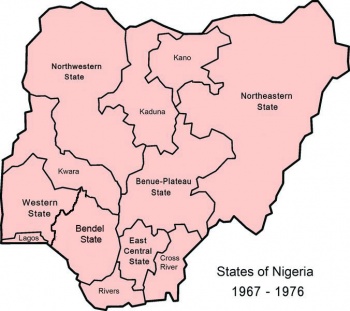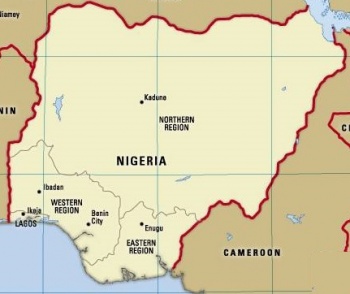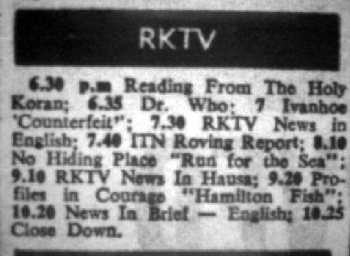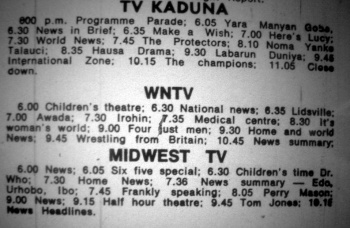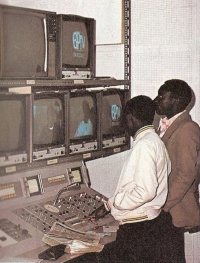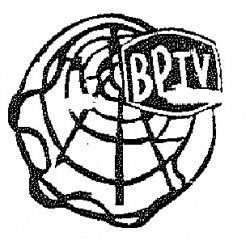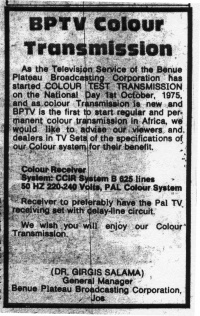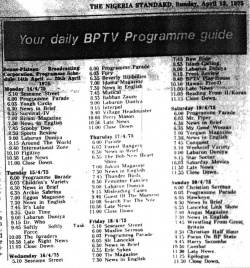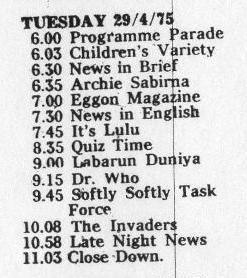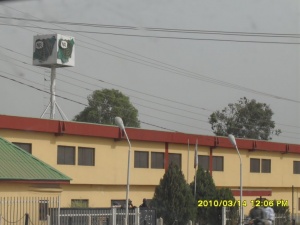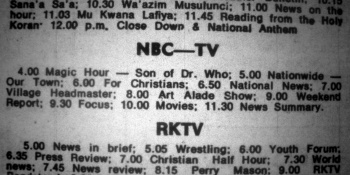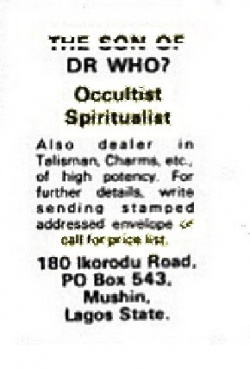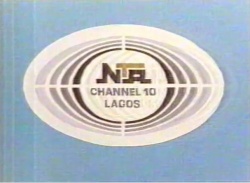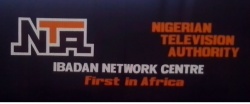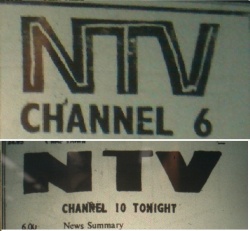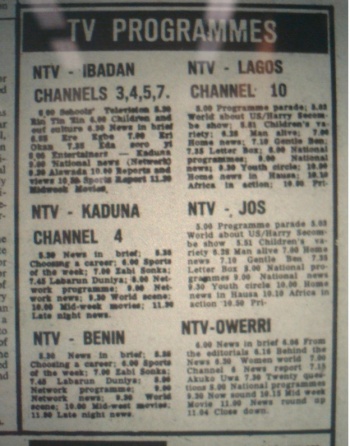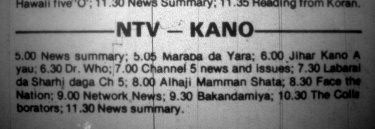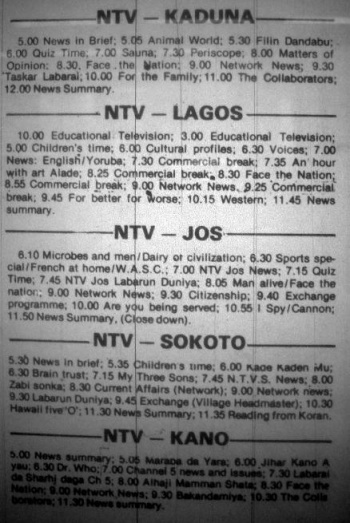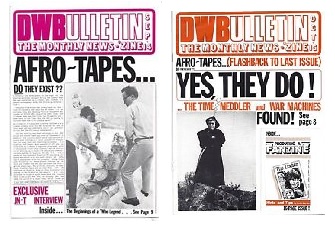Nigeria
Contents
|
Profile
| Country Number (9) | 1965 | FIRST & SECOND WAVE |
| Region | Africa | Commonwealth |
| Television commenced | 31 October 1959 | |
| Colour System | 1 October 1975 | PAL |
| Population | 1966 | 52 million |
| TV Sets | 1966 | 30,000 |
| Population | 1974 | 66.174 million |
| TV Sets | 1974 | 85,000 |
| Population | 1980 | 68.750 million |
| TV Sets | 1980 | 450,000 |
| Language/s | English | regional languages |
Television Stations / Channels
Nigeria is the most-populated country in Africa.
From 1960 to 1963, the country was made up of three regions, each with its own 'capital city'. From 1963 to 1967, there were four regions: Northern Nigeria, Western Nigeria, Lagos, and Eastern Nigeria; and from 1967 to 1976 (the period when Doctor Who aired) these were divided into 12 states (see map below right; if you 'hide' the Table of Contents, the map should line up):
- North-Western (Sokoto)
- North-Central (Kaduna)
- Kano (Kano)
- North-Eastern (Maiduguri)
- Kwara (Ilorin)
- Benue-Plateau (Jos)
- Western (Ibadan)
- Lagos (capital city, Lagos)
- Mid-Western / Bendel (Benin City)
- Rivers (Port Harcourt)
- East-Central (Enugu)
- South-Eastern / Cross River (Calabar)
By the 1990s, the country had been divided in over 30 states. And each of these had its own television service.
Television broadcasts in Nigeria commenced on 31 October 1959. The Western Nigerian Government Broadcasting Corporation (WNTV) was established in October 1959, based in Ibadan, and broadcasting to the south-western states. WNTV was the first television service operating in 'tropical' Africa. (North African countries such as Algeria and Libya had already established TV services a few years earlier.)
As WNTV's reach began to grow in the 1970s, it merged with a number of other TV stations in other parts of Nigeria, such as RKTV and NBC. It then merged with Mid West TV in Benin, and later with Benue Plateau in Jos.
WNTV commenced colour broadcasts in 1975 when it absorbed BPTV (see below). It was re-branded as NTV-Ibadan in 1976.
In time, each region launched its own independent television service, broadcasting foreign and locally-produced programming. The major stations, and the ones relevant to BroaDWcast, are:
- Radio-Television Kaduna / Radio Kaduna Television (RKTV): established in March 1962, based in Kaduna, and operated by the Broadcasting Company of Northern Nigeria (BCNN), RKTV provided coverage to the north of the country (a region later divided into the North-Central, North-Western, North-Eastern, Kano, Kwara and Benue-Plateau states). It was re-branded as NTV-Kaduna in 1976.
- Nigerian Broadcasting Corporation (NBC): a federal government-owned service, established in April 1962 (with the involvement of Television International Enterprises Ltd), based out of Victoria Island in the then-capital city of Lagos, and broadcasting to the south western states. It merged with WNTV and was re-branded as NTV-Lagos in 1976.
- MidWest TV: the state government in Benin established a TV service from Port Harcourt in 1972, broadcasting to the southern regions Benin and Rivers. It was also known as MTV. It was re-branded as NTV-Port Harcourt in 1976, by which time the region had been split into the Bendel and Rivers States.
- Benue-Plateau Television Corporation (BPTV): originally part of the RKTV "network" (see above), based in Jos, in central Nigeria; it was established in June 1974, and was the first to launch regular and permanent colour broadcasts in Africa (colour test transmissions commenced 1 October 1975). The Benue Plateau Broadcasting Corporation, which was later created to control both television and radio services, was officially inaugurated on 25 February 1975. It was re-branded as NTV-Jos in 1976.
- NTV: in 1976, the federal government established the Nigerian Television Authority, based in Lagos, under which all the major television services across Nigeria were controlled by a single body, although each continued to broadcast its own separate schedules of programming. Although the TV stations began using their new call-letters from 8 April 1976 (each station had the new pre-fix ident NTV) formal amalgamation didn’t commence until May 1977.
Despite the country's large population, only the "rich" could afford to own a television set, but bars and restaurants often had a set for the benefit of their customers.
Language/s
Nigeria has over 235 languages and dialects, although English is the principal common language. Regional television broadcasts contained an equal mix of foreign programming in English, and locally-produced cultural, religious and educational content in regional languages.
DOCTOR WHO IN NIGERIA
Nigeria was the ninth country to screen the series, and the first in Africa. (See Selling Doctor Who.)
BBC Records
Although BBC Records identify sales of Doctor Who to the generic name of "Nigeria", these disparate sales were to different broadcasters across the country.
In some of the BBC records, Nigeria is identified by region: a memo from July 1965 refers to Doctor Who being sold to "Lagos" but not to "Northern N". (NBC operated from Lagos in the south west, while the north was served by RKTV, the station on which the William Hartnell stories are known to have aired.)
In another memo dated 1966, the series was noted as being sold to "Nigeria (N & W)". Northern Nigeria was served by RKTV, and Western Nigeria by WNTV. It's not clear if this meant one sale and one screening to both regions at the same time, or one sale and two screenings on a regional basis, or two sales and two screenings. However, as far as we can tell, Doctor Who did not air on WNTV.
(Since the listings for RKTV were obtained from a newspaper published in Lagos, the first is the most likely. However, given the set-up of the television stations across Nigeria at that time, regional screenings of some series – including Doctor Who – may have occurred from time to time. Indeed, television programmes were often bicycled between states and aired more than once sometimes without those other screenings being paid for, often for the simple purpose of keeping the stations on the air.)
The Stanmark Productions Ltd advertisement from 1966, identifies Nigeria as one of sixteen countries screening Doctor Who by January 1966.
Nigeria is named in the list of 27 countries in The Making of Doctor Who 1972 Piccolo edition.
The Seventies records a sale of "(24)" stories by 28 February 1977. The Handbook identifies these as being: A, B, C, D, E, F, G, H, J, K, L, M, N, P, Q, R, S and BB for Hartnell; and NN, PP, QQ, SS, TT, and WW for Troughton.
In DWM, Nigeria is identified in 28 story Archives: the same 24 as in The Seventies, plus 4A, 4B, 4C, and 4D, with the dates of sale recorded as 1965 as the earliest, and 1979 as the latest.
In The Eighties - THE LOST CHAPTERS, there are "(4)" sales noted for Nigeria prior to February 1987. Those likely equate to the four Tom Baker stories as noted in DWM, although it appears that far more than only four Tom Baker stories aired.
With Doctor Who screening on several different channels over the years, it appears that each station bought from the BBC whatever stories were still available at the time, hence why some of the runs of stories are so disjointed.
REGIONAL STATIONS - TRANSMISSIONS
RKTV (1965-1967)
RADIO KADUNA TELEVISION
Radio-Television Kaduna / Radio Kaduna Television (RKTV) was established in March 1962 in Kaduna, and was operated by the Broadcasting Company of Northern Nigeria (BCNN). It was re-branded as NTV-Kaduna in 1976.
RKTV covered the Northern and largest region of Nigeria.
WILLIAM HARTNELL
17 stories, 81 episodes:
| A | An Unearthly Child | 4 |
| B | The Daleks | 7 |
| C | Inside the Spaceship | 2 |
| D | Marco Polo | 7 |
| E | The Keys of Marinus | 6 |
| F | The Aztecs | 4 |
| G | The Sensorites | 6 |
| H | The Reign of Terror | 6 |
| J | Planet of Giants | 3 |
| K | The Dalek Invasion of Earth | 6 |
| L | The Rescue | 2 |
| M | The Romans | 4 |
| N | The Web Planet | 6 |
| P | The Crusade | 4 |
| Q | The Space Museum | 4 |
| R | The Chase | 6 |
| S | The Time Meddler | 4 |
RKTV therefore bought the standard package of William Hartnell stories, GROUPs A to E that was available to English-speaking Commonwealth countries.
The programme was supplied as 16mm black and white film prints with English soundtracks.
*Origin of the Prints?
Since Nigeria was the first African nation to buy the series, RKTV would have received fresh prints from the BBC.
Transmission
The series made its Nigerian debut on Radio-Television Kaduna / Radio Kaduna Television (RKTV), Tuesday, 3 August 1965, at 6.35pm. It stayed on that day of the week and timeslot throughout the run.
In an article / interview with William Hartnell published in the 24 April 1966 issue of the UK newspaper, Daily Mirror, it is noted that Doctor Who is "a knockout in Nigeria".
The last clear listing for Doctor Who on RKTV was on 18 April 1967 -- but assuming there were no interruptions, this would be the 90th episode, nine more than the number of available episodes. We can only assume that there were nine pre-emptions during the run.
From 23 May 1967, the Doctor Who timeslot was filled by a series called "The Strangers"; but it's not clear on what date that started – see TV listings below. (The Strangers may actually be the 1954-1955 US series "The Stranger", or possibly the 1964-65 Australian series "The Stranger".)
Assuming that all 81 episodes played without interruption or pre-emption, and that the final seven listings in the papers were printing errors and should be for The Strangers, Doctor Who ended on 14 February 1967.
*Fate of the Prints?
It is very possible that RKTV forwarded its prints of the first 26 episodes / five William Hartnell stories to Ghana.
If, as is noted above, there were indeed subsequent regional screenings of the same episodes elsewhere in Nigeria, the episodes may have been returned from Ghana for that purpose.
The first eleven serials (up to The Rescue, may have gone to Kenya.
It has been reported that a TV station in Africa had phoned the BBC (in the late 1990s?) to inform they had a full set of black and white episodes of Doctor Who, and that after determining that it was the first two seasons, the BBC staff member told them they were not required and that they could be destroyed! It's not known what country this was, but if it was Nigeria, that could only be the case if the films had been retained for internal bicycling rather than external bicycling.
Alternatively, the other Nigerian episodes were subsequently forwarded directly to Sierra Leone, who commenced screening the series only a month after Nigeria had aired the final episode of The Time Meddler.
TV Listings
The listings for RKTV have been obtained from the Lagos newspaper, Daily Times.
All billings identify the series as "Dr Who".
Several issues did not contain listings for RKTV, and some had no TV listings at all. September to November 1966 was particularly bad for missing listings. And in April / May 1967, the lack of TV listings makes it unclear when Doctor Who ended and the replacement show "The Strangers" started.
MIDWEST TV (1973)
Unknown Station? (1973)
MidWest TV was established in 1972 in the southern region of Nigeria, out of Port Harcourt, and broadcasting to the southern regions of the country. It was also known as MTV. It was subsequently re-branded as NTV-Port Harcourt when the NTA took over, by which time the region had been split into Bendel and Rivers. (During the mid-1970s, MidWest used TIE Ltd as its UK representative for selling commercial airtime.)
WILLIAM HARTNELL (Continued)
Three stories?, 14 episodes?:
| N | The Web Planet | 6 |
| S | The Time Meddler | 4 |
| BB | The War Machines | 4 |
BBC Records indicate that by the early 1970s, only a handful of the William Hartnell stories were still available to purchase. MidWest TV (aka MTV) therefore bought at least two of these, both of which had previously screened on RKTV in 1967.
The programme was supplied as 16mm black and white film prints with English soundtracks.
IMPORTANT NOTE: There is some uncertainty as to whether all three serials were sold to the same station.
The BBC's records have both The Web Planet and The Time Meddler being sold to "Nigeria" under the same invoice number (2050), and clearance royalties paid out on 25 July 1973, whereas the sale for The War Machines had royalties paid out two weeks earlier, by 10 July 1973, but with a sequentially later invoice number (2508).
Therefore, it is extremely likely that the first two stories were sold together to one station, while The War Machines was sold to a completely different station.
And the fact that only ten clear airdates have been found for MidWest does support the sale of only one 6-parter and one 4-parter.
According to the 1973 and 1974 editions of the World Radio Television Handbook, the only other TV stations operating in Nigeria at that time were:
- Nigerian Broadcasting Corporation (NBC), based on Victoria Island, Lagos
- Radio Kaduna TV (RKTV) (see above)
- Western Nigeria Radiovision Service (WNTV) in Ibadan
If The War Machines did not screen on MidWest TV, then it would have been on one of those other three stations and/or their affiliate or relay stations.
This profile therefore could apply to two different stations.
*Origin of the Prints?
The prints of The War Machines that were supplied to Nigeria came from Singapore. Singapore had in turn received the prints from New Zealand; they had been dispatched by the NZBC on 10 January 1972. The prints had been cut by the New Zealand censors; although it appears that MidWest (or whoever the broadcaster was, if not MidWest) or the Singapore broadcaster had made further cuts to episodes two and three.
It is not known where the MidWest copy of The Web Planet came from; the serial did not screen in New Zealand due to censorship, and the fate of the film prints held by the NZBC was not recorded, but it is possible that The Web Planet was sent to Nigeria at the same time as The Time Meddler. Or, since Singapore sent The War Machines to Nigeria, they may have also been responsible for supplying The Web Planet.
The film prints for The Time Meddler were sent to Nigeria from New Zealand on 2 March 1973, which was only a month ahead of the MidWest transmission.
These episodes had been cut by the New Zealand censors. However, it appears that Mid West was responsible for removing the first few minutes of the opening TARDIS control room scene, which had the first onscreen appearance of Steven Taylor.
(An alternative is that the BBC in London sent MidWest a print of part one of The Time Meddler as part of its "Audition" process, and the print they supplied was already missing the opening TARDIS scene, an edit made by BBC Enterprises because The Chase was no longer available. New Zealand therefore may have supplied MidWest with another copy of the same episode.)
The fact that nearby Sierra Leone, where all the available season one, two and three serials were still held, didn't supply Nigeria with those three stories does raise the question as to why that was. One likely answer is that since Sierra Leone possessed a nearly complete run the BBC didn't want that set broken up, as it may have planned to make further block sales. (As it transpired, no further sales did eventuate, and Sierra Leone eventually returned all the prints to London in 1974.)
Transmission
After a six year break, Doctor Who returned to Nigerian televisions; now screening on MidWest TV, which, despite the name, broadcast to southern regions of Nigeria.
It is not clear when this run commenced - the first TV listings for MidWest TV appear in the 24 April issue, and the first billing for Doctor Who -- given as "Children's time Dr Who" -- appears in the Monday, 30 April 1973 issue; the timeslot is from 6.30 to 7.30pm. "Children's Time" also aired on Wednesdays and Fridays, with the shorter timeslot of 6.30pm to 7.00pm.
From the listings themselves, it looks like Doctor Who aired after a half hour slot of cartoons and other children's fare. The last listing for "Children's time Dr Who" is on 2 July 1973. (From the following Monday Doctor Who was replaced by The Flintstones.)
Although the exact start date cannot be determined from the available newspapers, based on the fact that the prints of The Time Meddler were sent from New Zealand on 2 March 1973, the series can't have started prior to that date. (With 14 episodes to account for, and the final listing being the 2 July entry, then the first episode of the run probably aired on 2 April, one month after those four films had been sent from New Zealand.)
However, if the 30 April entry is indeed the first, which means there are only ten billings, it's possible that sometimes Doctor Who occupied the full hour; did two episodes air back to back on some of these dates? (Indeed, the fact that the prints of The War Machines recovered from Nigeria had trims from the cliffhanger of episode two and the recap at the start of part three does suggest that those two episodes had possibly been spliced together.) Otherwise only ten episodes played – as noted above, this might be The Web Planet and The Time Meddler only, and The War Machines was indeed sold to a different station.
But if the sale of all three serials was to the same station, the order in which they were "sold" might not reflect the order in which they aired, so the broadcast order could have been:
- The War Machines, The Web Planet, The Time Meddler, or
- The Web Planet, The Time Meddler, The War Machines
And if there are indeed 14 episodes on the same station to account for the newspaper simply did not carry the listings for MidWest for all of April, and the first four episodes of the run, being The War Machines, which was the first to be sold, are omitted from the TV listings page.
If The War Machines did air on a different station, the name of the broadcaster and when the screening was have not been identified…
*Fate of the Prints
It was a passing comment on a 1984 BBC Radio 2 programme that Nigerian television was so far behind the times that Patrick Troughton was still the Doctor over there that prompted Ian Levine and the BBC to contact Nigerian TV stations in the search for missing episodes. This contact resulted in the recovery of The Web Planet, The Time Meddler and The War Machines, of which episodes were missing from the BBC archives.
(Note: Tom Baker episodes had been screening in Nigeria on the NTA stations at that time. Was it in fact these that the report was actually referring to? -- see the Further Troughtons? section below.)
The fact that all three stories were recovered at the same time has little bearing on their being screened by the same broadcaster; from April 1976 all the major television services across Nigeria were incorporated and controlled by the NTA, which also took control of the film holdings of these stations. As such MidWest (and the 'other' station if there was one) had apparently been instructed to forward their film holdings to the same central location, the facility from which the 14 films were later recovered.
All 14 of these Hartnell episodes were subsequently returned to the BBC in 1984/85. Part one of The Time Meddler was missing parts of the opening TARDIS scene. This does not appear to have been cut in New Zealand, as the episode's running time is correct in NZBC's records. Did Nigeria cut the scene, or were they supplied with part one cut by the BBC as an Audition print?
The recovered prints of The War Machines exhibited the cuts made by the New Zealand censor, as well as additional cuts to parts two and three, which were made by Singapore or the Nigerian station, MidWest (or another…)
The BBC already held copies of The Web Planet: a set of uncut negatives plus a set of prints, which were incomplete (part one was missing the opening recap from The Romans and part six had an alternative "NEXT EPISODE" closing caption). The returned "Nigerian" prints were complete and uncut.
TV Listings
Listings for MidWest TV come from the New Nigerian, which was published from Kaduna. This paper only started publishing listings for MidWest from Tuesday, 24 April 1973, so it is unclear when exactly Doctor Who started; the first of only ten listings is dated 30 April 1973, and there are 10 or 14 episodes to account for.
The six available airdates billed the series as "Children's time Dr Who".
The "missing" four episodes may have aired in April, or, as noted elsewhere, on an entirely different station. There were no papers available for 7 May or the last three weeks of June 1973.
From July 1973, New Nigerian only occasionally published MidWest TV listings.
BPTV (1974-75)
BENUE-PLATEAU TELEVISION CORPORATION (BPTC)
Benue-Plateau Television Corporation (BPTV) was established in Jos in June 1974, on Channel 7; it was initially part of the RKTV network. It was the first TV station in Africa to launch regular and permanent PAL colour broadcasts, from 1 October 1975. It was re-branded as NTV-Jos in 1976.
PATRICK TROUGHTON
Four stories, 24 episodes:
| NN | The Abominable Snowmen | 6 |
| PP | The Enemy of the World | 6 |
| The Web of Fear | 6 | |
| SS | The Wheel in Space | 6 |
The four stories had screened in New Zealand between September 1970 and September 1971. New Zealand did not screen The Ice Warriors or Fury from the Deep, neither of which screened in Nigeria.
Based on the way programmes were sold by the BBC at this time, it appears that the Nigeria sale (a minor Commonwealth broadcaster) could only include those four stories because they had previously been purchased by New Zealand (a major Commonwealth broadcaster).
These four serials (from GROUP D of the Patrick Troughton stories) were initially purchased by RKTV, but if and when the Kaduna station aired them first is unknown, as no TV listings could be found.
But at least two of the serials -- The Enemy of the World and The Web of Fear -- were sent to BPTV in Jos, where they did screen in 1975. (Like Canada, Australia and New Zealand, TV programmes in Nigeria were often screened multiple times on a region by region basis under the one sale.)
The programme was supplied as 16mm black and white film prints with English soundtracks.
*Origin of the Prints
The film prints for The Enemy of the World and The Web of Fear had been supplied to RKTV / BPTV by RTS in Singapore, who in turn had acquired them from RTV in Hong Kong in 1970. It's possible that Gibraltar and Zambia had acquired the films from Singapore first, and BPTV got the films from Zambia. (Presumably the other two Troughton stories were supplied via the same route.)
Transmission
Less than two years after the MidWest TV screenings, Doctor Who was seen again in central Nigeria.
We have been unable to ascertain precisely when the run of episodes commenced (due to lack of TV listings prior to April 1975), but the final of only three listed episodes was on Tuesday, 29 April 1975, at 9.15pm. With 24 episodes to account for, and if the series ran without interruption (there may have been breaks over Christmas / New Years), it potentially could have commenced on 19 November 1974 (which certainly ties-in with the date of sale being by October 1974 as recorded in BBC paperwork).
Assuming that all four serials aired in the correct order, this 24 week run started with The Abominable Snowmen, and concluded with The Wheel in Space, marking the final time that these four serials aired on television...
But of course there is no absolute certainty that all 24 episodes aired in one continuous run. There are only three published listings, which really only tells us that half of one serial at least screened! It is entirely possible that the others weren't aired at that time, but were held over and didn't reach the screens for a few more years. Maybe it was these "late" screenings that were seen by the BBC technician, possibly explaining how says he saw Patrick Troughton episodes during a visit to Nigeria in the early 1980s -- see section below.
*Fate of the Prints
BPTV was the last-ever television station to screen these four stories.
When the NTA was established in 1975/76, the film prints were retained at the BPTV station, possibly because they were intended to be but ultimately weren't bicycled around other regional stations owned by RKTV.
In February 2008, the old BPTV station was upgraded to a Zonal Network Centre for the Nigerian Television Authority (NTA). (News report HERE.)
By late 2011, all 12 prints of The Enemy of the World and The Web of Fear (all still in the ex-RTV Hong Kong film cans) were located by Phil Morris at the upgraded Jos zonal relay station. Sadly, the third episode of The Web of Fear disappeared from the station before it could be shipped to the UK. The other 11 films were eventually returned to the BBC in 2013.
The discovery of the episodes even made it to a Nigerian nostalgia forum:
The relay station subsequently suffered serious damage when a fire ravaged the building in February 2015:
TV Listings
Listings are from the Jos newspaper, The Nigeria Standard. The paper was published on Sundays only, but with TV listings for the full week.
TV listings were not published prior to the 13 April 1975 issue. Only three billings for "Dr Who" were found – 15, 22, 29 April 1975. All papers were checked to the end of 1975, and despite regular TV listings appearing, there were no further listings at all for Doctor Who. Therefore, we assume that these listings are for the final three of the 24 episode run.
Unknown Station/s (1975)
The next two Doctor Who serials to be sold were:
PATRICK TROUGHTON (Continued)
Two stories, 9 episodes:
| TT | The Dominators | 5 |
| WW | The Krotons | 4 |
The two programmes were supplied as 16mm black and white film prints with English soundtracks.
However it is not known which station in Nigeria this was; BBC Records indicate that royalties for the sale of The Dominators to "Nigeria" (under invoice number 14563) were paid out on 20 November 1975, and for The Krotons (invoice 15670) on 6 February 1976. But there is no certainty that both stories were actually sold to the same station.
According to the 1976 edition of the World Radio Television Handbook, the only four TV stations operating in Nigeria in 1975 were:
- Nigerian Broadcasting Corporation (NBC), based out of Victoria Island in Lagos
- Eastern Nigeria Television (ENTV), based in Enugu
- Radio Kaduna Television (RKTV) (see above)
- Western Nigeria Radiovision Service (WNTV) in Ibadan
There were certainly other TV stations in operation at that time, one in each state, which for reasons unknown are not included in the WRTH (although this may be because they may have been affiliated to the three that are listed):
- North West Television
- Kano State Television
- Nigerian Broadcasting Commission (NBC)
- MidWest Television
- Rivers State Television
- Benue Plateau Television
Since BPTV was preparing to transmit in colour by October 1975 the station may not have been purchasing any further black and white material in the lead-up to that launch. Also, newspapers to the end of 1976 were checked and there were no listings at all for Doctor Who that year, so we think it safe to exclude Benue Plateau TV from this list of potential stations.
*Origin of the Prints?
Singapore had already supplied MidWest with at least one serial in 1973, and had previously furnished RKTV / BPTV with four stories in 1974 -- see both above -- so it is possible that RTS was being used as the go-to supplier for further film prints destined for Nigeria. One or both serials may have come from that source. If the unidentified station was RKTV, then that means Kaduna was probably the BBC's main sales contact in Nigeria.
Alternatively, the film prints of one or both of these two serials were supplied via Gibraltar which, like the Nigerian Broadcasting Corporation, had an affiliation with TIE Ltd.
Transmission
No listings could be found for Dr Who / Doctor Who in any newspapers for late 1975 or during 1976.
However, the New Nigerian, which was published in Kaduna, features four listings under NBC-TV for something called "Magic Hour – Son of Dr Who", which aired from Sunday, 7 December 1975 until 28 December 1975. (The 14 December paper was missing.)
What is not clear is, is this a billing for Doctor Who (in which case given the unusual billing, did the programmers or editorial staff think Troughton's Doctor was the son of Hartnell's?), or is it for something else?
(Of course, to be the former, that would mean NBC had some familiarity with William Hartnell's older Doctor, despite not having screened any of his episodes. But if these Troughton episodes had been supplied by TIE Ltd, the distributor would certainly have known about the older first Doctor…)
Many of the papers before and after the dates found are missing or do not have programmes listed prior to 6.00pm, so it's not clear exactly how many previous or subsequent episodes of "Magic Hour - Son of Dr Who" there may have been between November 1975 and March 1976, which happen to be the two months identified in BBC records for when Doctor Who had been sold to Nigeria.
It could be a simple case of NBC initially auditioning then purchasing and screening just The Dominators to begin with, then purchasing and screening one further story, The Krotons, a few months later, a date range for which TV listings were not published.
WHO IS THE SON OF DR WHO?
However, further research into the name "The Son of Dr Who" has revealed that there was someone who used that as a stage-name. In his online biography, Dr. Oluaiye Mobolaji Alimi Salami Naibi Oba Ogboni, reports that he studied magic in London, and on returning to Nigeria, "was the in-house magician performing on NTA Channel 10 with late Professor Peller and son of Dr. Who between 1976 – 1978."
This implies that Dr Ogboni, Professor Peller and Son of Dr Who were three television personalities performing together on NTV-Lagos Channel 10 during the late 1970s. Of course that would make it an extreme coincidence that someone calling themselves "The Son of Dr Who" was appearing on television around the same time that Doctor Who should also have been on somewhere in Nigeria, and for which separate listings cannot be located.
But it is possible that Ogboni's biographer has simply got his/her facts slightly askew; when they say Ogboni appeared with "the late Professor Peller and son of Dr Who" they might mean that he was on television in the same hour of programming that included Peller's magic show which was paired with Doctor Who.
We have checked with various international Colleges of Magic, and none has any record of a Nigerian magician using the stage-name "Son of Dr Who"; but of course this person may not even have been a magician nor registered with a College.
But there was someone calling themselves "The Son of Dr Who?" (with a question-mark). An Occultist Spiritualist, Talisman and Charm dealer based in Lagos state called THE SON OF DR WHO?, advertised their services in a 1979 African publication called "Drum".
And there is also a placeholder Facebook page for a "public figure" in Lagos of the same name and also with a question-mark!
All of which does seem to point to "The Son of Dr Who?" being a title used by a well-known Nigerian Occultist who appeared on television with Professor Peller, and therefore the newspaper listings found are not billings for Doctor Who.
(There is also a travel agent in Lagos called "Dr Who's Consulting". Do they do time travel…?)
Then there's the question of where did the name "Son of Dr Who?" itself come from? Had this person seen the screenings on one of stations in the 60s or 70s?; or perhaps they had seen the Peter Cushing movies?; or was it something they had devised without any prior knowledge of the series?
Which doesn't really help much…
Conclusions
If the four listings for "Son of Dr Who" are for Doctor Who -- with the newspaper messing up the billings (something that is not unusual for Nigerian newspapers), with the paper thinking the TV series called "Dr Who" had something to do with the Occultist The Son of Dr Who, and changing the title of the billings accordingly, or the 4.00pm show featuring both the Occultist The Son of Dr Who and Doctor Who in the same one hour block -- the four available published listings are therefore the start, middle or end of a run of episodes that potentially included either of or both The Dominators and The Krotons.
Or the four are billings for The Krotons only, and The Dominators therefore aired elsewhere on a different station. If that is indeed the case, we have been unable to identify that station and the transmission dates…
And if the four listings for "Son of Dr Who" are not for Doctor Who, and are indeed for a one hour magic show featuring the occultist The Son of Dr Who?, then we have no idea when or on which of the potential stations it was that The Dominators and The Krotons aired...
There is a possibility that the three April 1975 listings identified for BPTV in Jos (as detailed above) were actually for The Dominators or The Krotons. We just don't know.
Based on the available evidence, we're prepared to accept that these listings under NBC are NOT for Doctor Who. Which means that the station/s on which The Dominators and The Krotons aired is still unknown…
*Fate of the Prints?
Even though we don't know for sure where and when these episodes aired, Nigeria was in the event the final country to purchase and screen these two Troughton serials.
The films were retained, returned or destroyed. (They may have been sent to the same NTA film storage facility from which the MidWest episodes were later recovered.)
If the prints were returned to the BBC, these may be the ones that were donated to the BFI in 1977…
TV Listings
Many Nigerian newspapers were searched for 1974, 1975 and 1976. Many of them did not print any TV listings at all, and those that did often only printed one or two stations from time to time, and not always the same ones on a regular basis -- for instance, one paper printed listings for three stations one week, then the following week an entirely different set of stations. But there were no listings found for Doctor Who, which makes it difficult to narrow down when and where these nine episodes screened.
The billings for "Son of Dr Who" on NBC-TV have been obtained from the New Nigerian, which was published from Kaduna. Listings for that channel were infrequent, and prior to the four listings that have been ascertained, the paper only printed programming that was after 6.00pm (with "Magic Hour - Son of Dr Who" screening at 4.00pm, it was therefore missing from the previous listings) while in the next nine weeks after the last of the "Son of Dr Who" listings, the paper was either missing or didn't include listings for NBC-TV.
NTA / NTV (1979-199?)
NIGERIAN TELEVISION AUTHORITY (NTA)
Before the NTA came into effect from 8 April 1976 there were a number of state-owned TV stations (one for each state -- see 1976 map at top of page) that were in operation across Nigeria:
- North West Television, Sokoto (Northwestern)
- Radio Kaduna Television, Kaduna (RKTV - see above) (Kaduna)
- Kano State Television, Kano (KSTV) (Kano)
- Benue Plateau Television, Jos (BPTV - see above) (Benue Plateau)
- Western Nigerian Radiovision Service, Ibadan (WNTV) (Western)
- Nigerian Broadcasting Commission, Lagos (NBC) (Lagos)
- MidWest Television, Benin (aka Bendel TV) (MTV - see above) (Bendel)
- Eastern Nigerian television, Aba (ENTV) and East Central Broadcasting Service, Enugu (ECBS) (East Central)
- Rivers State Television, Port Harcourt (RSTV) (Rivers)
By the end of 1979 all Nigerian television stations had merged with and were under control of the Nigerian Television Authority, and all TV stations being rebranded and pre-fixed with NTV; at that time, there were 20 NTV stations, some of which also operated as regional relay stations:
- NTV-Aba/Owerri (Channel 6)
- NTV-Abeokuta (Channel 12)
- NTV-Akure (Channel 11)
- NTV-Bauchi (Channel 9)
- NTV-Benin (Channel 7)
- NTV-Calabar (Channel 9)
- NTV-Enugu (Channel 2)
- NTV-Ibadan (Channels 3,4,5,7)
- NTV-Ilorin (Channel 6)
- NTV-Jos (Channel 7; previously BPTV – see above)
- NTV-Kaduna (Channel 4,6; previously RKTV – see above)
- NTV-Kano (Channel 10)
- NTV-Lagos (Channel 10)
- NTA 2 Lagos (Channel 5)
- NTV-Maiduguri (Channel 10)
- NTV-Makurdi (Channel 10)
- NTV-Minna (Channel 10)
- NTA-Port Harcourt (Channel 10; previously MidWest – see above)
- NTV-Sokoto (Channel 3)
- NTV-Yola (Channel 8)
Colour broadcasts had commenced in Nigeria in 1975 (on BPTV and WNTV), and all the NTA stations were converted to PAL colour in due course, although most viewers still only had black and white sets.
When Doctor Who returned to Nigerian TV screens in the late 1970s, it screened on a number of (if not all) the NTA / NTV stations across Nigeria. Some of the stations may even have continued to repeat the series well into the 1990s.
The entire Jon Pertwee era was skipped (although see note below about Day of the Daleks), and instead viewers saw Tom Baker's fourth Doctor.
Although The Eighties reports a sale of only four stories up to 1987, it is clear from the airdates that far more stories aired. Other BBC Records indicate that the first four stories were Robot, The Ark in Space, The Sontaran Experiment, and Revenge of the Cybermen, sold by September 1978.
(Our thoughts here are that the BBC records used to compile the 1987 list were incomplete, and only sales to Nigeria to the end of 1978 (i.e. the first four stories) were documented. The remaining sales occurred after 1978, and thus are not recorded.)
As far as can be determined, NTA screened Tom Baker's first three seasons only:
TOM BAKER
17 stories?, 72 episodes?
| 4A | Robot | 4 |
| 4B | The Sontaran Experiment | 2 |
| 4C | The Ark in Space | 4 |
| 4E | Genesis of the Daleks | 6 |
| 4D | Revenge of the Cybermen | 4 |
| 4F | Terror of the Zygons | 4 |
| 4H | Planet of Evil | 4 |
| 4G | Pyramids of Mars | 4 |
| 4J | The Android Invasion | 4 |
| 4K | The Brain of Morbius | 4 |
| 4L | The Seeds of Doom | 6 |
| 4M | The Masque of Mandragora | 4 |
| 4N | The Hand of Fear | 4 |
| 4P | The Deadly Assassin | 4 |
| 4Q | The Face of Evil | 4 |
| 4R | The Robots of Death | 4 |
| 4S | The Talons of Weng-Chiang | 6 |
The NTA stations therefore would have bought GROUPs A to C of the Tom Baker stories.
The episodes would have been supplied on PAL colour video tapes (most likely U-Matic), with English soundtracks.
Regional Transmissions
The Tom Baker stories aired on various NTA / NTV stations on a regional basis:
NTV–KANO
NTV–Kano is the only station for which we have (so far) found published TV listings:
As far as we can tell, the first episode on NTV-Kano was on Monday, 8 January 1979. (We are unsure as to the exact start date, as there was no listing for NTV-Kano in the 1 January paper.)
The series screened weekly at 6.30pm. The run lasted for 72 weeks, from 8 January 1979 to 19 May 1980. For 11 dates during the run, something else was listed in that slot. But the listings for "Marine Biology", "Young World", "Komai da Ruwanka" (*) and "A Gani Na" (*) may be symptomatic of the duplication errors that affected the New Nigerian back in 1974.
The fact that 72 is also the same episode-count for Robot to The Talons of Weng-Chiang does suggest that these were the only stories that aired.
- (*) These two programmes are in Chadic, a language spoken in Ghana and Nigeria; the former literally translates as "Everything that your water" (whatever that means!) and the latter as "How to see". A Gani Na is listed in the 6.30pm slot through until the end of August 1980.
TV Listings
The NTV-Kano listings are from the New Nigerian. All billings are given as "Dr Who". There was no listing for NBC-Kano in the 1 January 1979 paper, so it's possible the series commenced earlier than 8 January.
NTV–ILORIN
Season 12 of the series (at least) aired on NTV-Ilorin "around 1989 or so", as THIS FORUM POSTER recalls; they even post several pictures of the episodes they remember seeing.
NTV–LAGOS
The NTA station in Lagos aired the series "in the late 80s and 90s", according to THIS reporter:
- "The other great British role is the Doctor. I have been a fan of Doctor Who since I was a child, hiding behind the settee scared silly, just as the programme-makers would have wanted. The bulk of that fandom was formed in the same country where nine lost episodes were recently found gathering dust in a TV facility in a northern city – Nigeria. I grew up watching Doctor Who with my family in Lagos, and I'm not terribly surprised by the find – pre-internet and long before international fan conventions in San Diego – Doctor Who was a big deal in Nigeria. And as for the tapes being decades old, that makes sense too – in the late 80s and 90s when we were there, while all the British kids were watching Sylvester McCoy ("Seven"), my Doctor was "Four" aka Tom Baker, an actor who had vacated the Tardis before I was even born."
NTA 2 – LAGOS
This TWEET from May 2013, refers to Tom Baker on "NTA 2 Channel 5", which was the second of two channels operating out of that city.
Other NTA Stations
Other non-specific references to screenings around Nigeria have been found online:
- This TWEETER in October 2010 asks if anyone "grew up watching Dr Who in Naija".
- And this FORUM contains several posts about the series.
- In a comment posted on THIS BLOG, the writer recalls seeing the series "on Sunday evening at 6pm" on a black and white TV.
- Similarly, THIS WRITER, recalls "watching Doctor Who every Sunday".
- Several posters HERE recall seeing the Daleks, Pyramids of Mars and The Brain of Morbius in the 1980s.
- Further down the same thread, THIS POSTER says Day of the Daleks was a frequently-repeated serial, and yet BBC Records do not report a sale of that or any other Jon Pertwee story to Nigeria (and there are certainly not enough airdates in the Kano listings above to support any such additional screenings).
- This blogger HERE says "state TV stations in Nigeria back in the day played those early seasons of Tom Baker as Dr. Who over and over again all through the late 80s and probably into the 90s. Ask many Nigerian, Tom Baker (Dr. Who from '74 - '81) is the one and only Dr. Who."
These various online comments indicate that not only did the series cycle around the various NTA stations in the late 1970s and 1980s, but that some were also regularly repeated for many years.
As noted much earlier, a comment was made by a radio interviewee in 1984 that Patrick Troughton episodes were still playing in Nigeria at that time; we wonder whether perhaps the comment was actually about these Tom Baker episodes instead, and the speaker was merely jokingly stating it had been Patrick Troughton. Certainly, none of the forum posters quoted above mention seeing any of the Troughton episodes…
There is no clear record that any stations in Nigeria screened Doctor Who after the runs across the various NTA stations had concluded.
However…
FURTHER TROUGHTONS? (1980s?)
It was a Radio 2 interview in 1984 that was ultimately responsible for the recovery of the MidWest episodes, The Web Planet, The Time Meddler and The War Machines -- see above…
This was all reported in the September 1984 issue of the fanzine DWBulletin (DWB) (#14), which said
- "What sparked it off was an interview on a Radio 2 magazine programme with a technician (from this country [i.e. England]) who is involved in setting up a satellite education / communications system to Nigeria. It was he who revealed how backward Nigerian TV was, being all black-and-white with the most recent DR WHOs (as a comparison with our network) being those with Troughton in. Steve Bryant [who was Archive selector at the BBC] checked up on this and indeed the BBC did purchase [sic] the Troughtons years ago."
This last point is very important; we now know that several different stations in Nigeria aired various Troughtons during the 1970s, but that distinction was not known to anyone at that time. We are not told where in Nigeria the technician had been, but it would presumably have been Lagos, where the NTA was based.
The quote from DWB also says "indeed the BBC did purchase the Troughtons". This is clearly a typo: but what is the error? Should it be "indeed the BBC did sell the Troughtons" or "indeed the [initials of a Nigerian station] did purchase the Troughtons". Is BBC a mistake; is the name of the Nigerian station that DWB is referring to but mistyped as "BBC" supposed to be the NBC?
Also, Nigerian TV wasn't necessarily that backward; as we've noted above, Tom Baker episodes were airing in colour in syndication in various states at that time. If anything, what the technician was meaning by "backward" was that despite them having colour transmission capabilities those Nigerians with TVs still had black and white sets.
In the following issue of DWB (#15, October 1984), the news story was expanded upon:
- "… [it was] a Radio 2 broadcast concerning the setting up of educational satellite TV in Africa. During the interview, the relative state of Nigerian TV and our own was made by a comparison of the two countries [sic] DOCTOR WHO output; theirs being all black-and-white and featuring a Doctor thought to be Patrick Troughton."
But note that it was here stated it was now "thought to be Patrick Troughton", which shows that there was still clearly a degree of uncertainty as to what the technician had supposedly seen.
And to add even more confusion, ex-BBC archivist Steve Bryant told Stage & Television Today (in the 4 July 1991 edition) that "a Radio One DJ had been there [to Nigeria] and joked that they're so far behind there that Dr Who is still William Hartnell. The fans jumped on it, we got in touch with the Nigerian Broadcasting Authority, they tracked it down and we got two complete stories, including The War Machines".
It's clear from Bryant's comments here (even if he is slightly off the track with his belief that it was Hartnell, and a BBC DJ who had made the claim) that he considered what the "DJ" [sic] had said was done so in jest, rather than as a statement of fact.
There are no further sales of 1960s' Doctor Who to Nigeria noted in any BBC records beyond the final two season 6 serials in 1976. There is a very remote possibility that further screenings of Troughton episodes took place in Nigeria but they were repeats (either paid for or unpaid for) of stories bought already than of additional stories acquired from somewhere illicitly.
Taking all this on board what the technician meant was either:
- a) Patrick Troughton stories did air in Nigeria during the early 1980s; these could have been "late" screenings of the serials purchased by BPTV and the unidentified station/s (as noted above), or were repeats of the stories that had already aired (as detailed above), or were of other season 4, 5 or 6 serials but which are not for some reason recorded in any BBC sales documentation
- b) he is mistaken, and what he saw was actually the Tom Baker serials shown on NTA stations in late 70s/early 80s on a black and white set (and who he thought was Troughton was a guest actor in one of the Baker serials?)
- The very fact that as we noted earlier none of the posters in the forums linked to above mention seeing Troughton in the 80s does suggest the technician wasn't necessarily telling the complete truth
- c) he didn't actually see any episodes at all and was merely using Doctor Who and Patrick Troughton as an off-the-cuff jest to press the point that most Nigerians still had black and white televisions
Unless a copy of this 1984 Radio 2 interview surfaces we will never know precisely what was said nor the context in which it was said.
On balance, we think the technician did see Doctor Who on black and white TV when he visited Nigeria, but it was Tom Baker, not Patrick Troughton…
AIRDATES
| ← AIRDATES ...... (CLICK ICON TO GO TO TABLE SHOWING EPISODE BREAKDOWN AND AIRDATES - N/S = story title is Not Stated) |
We have mostly accounted for all 200 airdates for Doctor Who that screened in Nigeria between 1965 and 1980, ten of which are "repeats" of The Web Planet and The Time Meddler.
Nigeria in Doctor Who
- Gravitron Moonbase crewman Ralph deBayo (played by Mark Heath) wears a Nigerian flag (albeit upside down!) on his tunic (The Moonbase).
